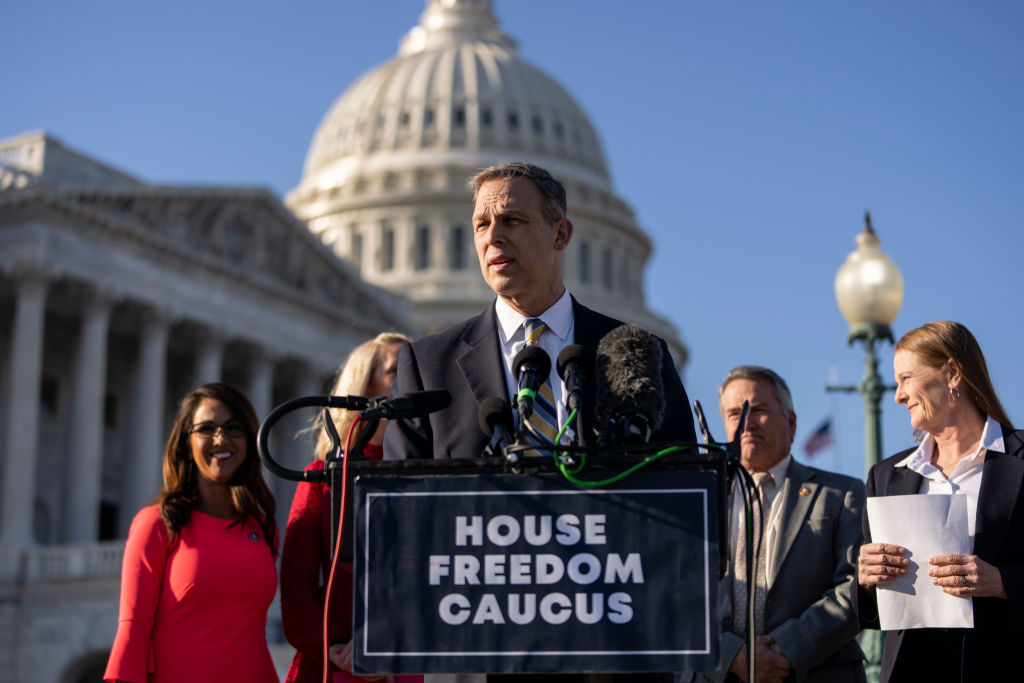Without Limits

The official Republican vision of political power is so constrained that you have to wonder why they want it.
In the aftermath of the failed revolt against a McCarthy speakership, the Freedom Caucus has been granted a litany of concessions, including guaranteed votes on several of their legislative priorities. Though they may lack polish or prudence, the Freedom Caucus often has a better sense than Republican leadership of what the party’s legislative priorities ought to be. When leadership wants to focus on adjusting the marginal tax rate, the hardliners seek to steer the party toward core issues, including structural matters regarding Congress. That said, there is one reform that many conservatives have mistakenly been championing for years that the Freedom Caucus has now foolishly pushed to the fore of the legislative agenda—congressional term limits.
Term limits have been a favorite proposal among conservatives since at least the 1990s, when the Gingrich Revolution included it as a cornerstone of its reform agenda. While it ultimately failed to pass, the Revolution did successfully gut committee staff and impose six-year term limits on chairs and ranking members. Anyone interested in a deeper explication of the disastrous consequences of these reforms should review the work of Joseph Postell, but it suffices to say that the effect, far from heralding in a new era of limited government, has only further handicapped the ability of Congress to check the administrative state.
Congressional term limits will have similar consequences. Whatever institutional problems plague Congress, term limits will only serve to exacerbate them. It has been a long while since Madison’s observations in Federalist 51 have had any bearing on our political reality. In our modern age, the individual interests of representatives rarely, if ever, coincide with the rights and authority of Congress within the constitutional framework. Term limits will all but eliminate any remaining chance of that system ever being recovered, as a revolving door of junior congressmen, without the guidance of senior members, will deprive the legislative branch of what little expertise and institutional identity it has left. The body will become increasingly ineffectual, beholden to the expertise of administrative agencies and the lobbying efforts of special interests. Accordingly, term limits will neither advance the interest of the American people nor the cause of restoring republican government. The economic elite, pleased to have their opportunities to buy politicians multiplied, and the administrative state, whose imperium will only grow more uncontested, will be the major benefactors.
Congressional proponents of term limits seem unbothered by these consequences. Republicans appear to have little interest in ever governing. As a caucus, they understand that their own ineptitude will prevent them from ever achieving a stable and prolonged majority. Because they can never picture themselves continuingly holding a position of power, they seek to sabotage the tools they will never wield. It is a strategy rooted in defeatism. They know they can’t win, they know they can’t govern, so they obstruct. They are too weak—both politically and spiritually—to take on any other institution of consequence within the modern regime, so they direct their bitter machinations against the sick man of the Constitution.
But our political contests will not end if Congress becomes more ineffectual. It will only further shift the battlefield onto the terrain of the courts and administrative state—two places where the Right suffers from a structural disadvantage. Though conservatives currently enjoy a comfortable majority on the Supreme Court, a sustainable political movement doesn’t bank its success on the chance occurrence that the life expectancy of nine geriatric justices will continue to coincide with intermittent electoral success.
This lack of will to win is why Republicans fixate on reforms like term limits. Whether it be term limits, a convention of states, or a balanced budget amendment, the GOP is always concocting the political reform equivalent of clickbait: this “one weird trick” will win back the country and restore the Constitution! They are half-baked ideas that are easily peddled to an uninformed electorate to show that a politician has really big and important ideas on how to get the country back on track, while conveniently giving them an excuse to never engage in any of the hard work of actually governing.
The hard truth is, there is no “one weird trick” that is going to magically transform the regime. No single reform, election, or candidate is going to reverse a century’s worth of political decay. Meaningful progress is only ever going to come about through sustained electoral success and the laborious and unceasing work of effective governance. As such, if the Right is actually serious about the former, it must prepare to perform the latter. That means preserving what little is left of Congress’s institutional integrity and moving past the short-sighted reform agenda of 30 years ago.
The American Mind presents a range of perspectives. Views are writers’ own and do not necessarily represent those of The Claremont Institute.
The American Mind is a publication of the Claremont Institute, a non-profit 501(c)(3) organization, dedicated to restoring the principles of the American Founding to their rightful, preeminent authority in our national life. Interested in supporting our work? Gifts to the Claremont Institute are tax-deductible.
One dose will erase your whole political mind.
The case of Reddit shows how bad it’s gotten.




